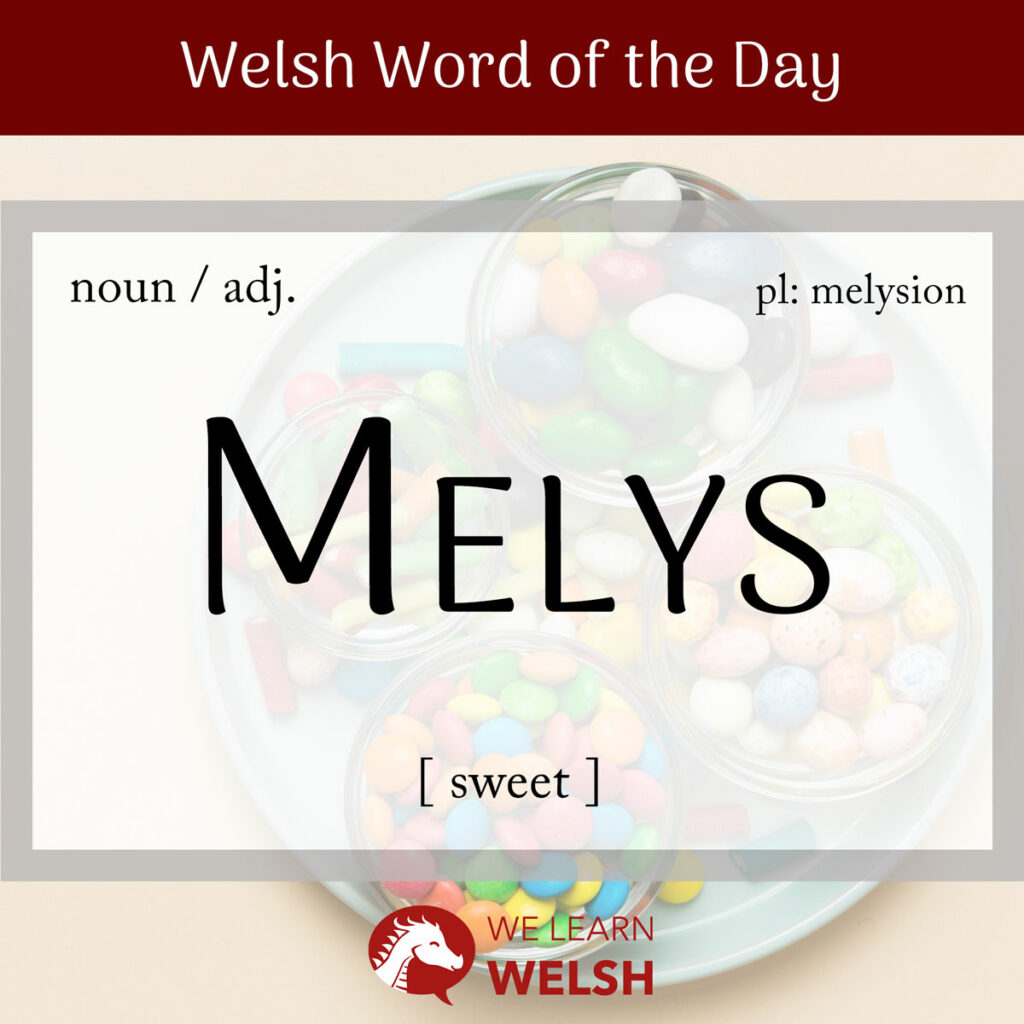Today’s Welsh word of the day is melys, an adjective meaning sweet.
melys
sweet
Melys describes something that is sweet in taste. Conversely, it’s less often used to mean a sweet smell, sound, or personality than it is in English – although it’s not completely impossible to hear it used in this sense. It’s also sometimes used as a noun, as in a packet of sweets (pecyn o felysion).
Sometimes, in the South, you may hear it pronounced a bit more like this:
Historically, it has also been spelt melus or melis, but the former has become uncommon and the latter is obsolete.
You may notice a similarity to the noun mêl (honey). Indeed, mêl, melys, and melyn (yellow) all come from the same proto-Celtic root word, *meli (honey). So, anything that tastes sweet in Welsh more literally tastes like honey. And I’d definitely recommend organic Welsh mêl – I ask for a jar of honey from my grandparents’ farm for my birthday every year!
Melys only responds to the soft mutation, as below.
Soft mutation
felys
Nasal mutation
N/A
Aspirate mutation
N/A
The most frequent, important mutation context to remember is that adjectives soft mutate if used to describe any singular feminine noun. So, a sweet cake is a teisen felys, while a sweet pastry is a crwst melys.

And if you’re describing plural nouns, you should technically need to use the plural form of the adjective, which is melysion (or sometimes melyson), So, if you wanted to request some sweet berries to go with your teisen or crwst, you might ask for mwyar melysion. However, this sounds quite old-fashioned in colloquial speech. Most people just use the singular form melys.
For a sweet smell, you can use the word melysber, but I think it sounds a little formal. Pêr is the most common translation. And interestingly pêr is also the go-to word for a sweet voice (which can also be described as persain or melodaidd).
You’ll also hear melys used in both of these senses, though, and even to describe a sweet, kind person, although it’s much more common to go for annwyl (dear / darling), mwyn (tender / gentle) or hyfryd (lovely).
Mae’r siocledi ‘ma’n rhy felys i mi.
These chocolates are too sweet for me.
As a noun, melys is masculine. It can mean either a sweet as in a boiled sweet, or sometimes a pudding. There are more common words for both of these meanings – pwdin for pudding, and for sweet, regional slang is usually used. This would most commonly be losin in the South and fferin in the North. Melys or melysion (sweets) sounds very formal.
Melyster / melystra (sweetness) is one of the five main blasau (tastes / flavours) that humans can experience with our sawr (sense of smell / taste). Aside from melys, food can blasu (taste) either hallt (salty), chwerw (bitter), sawrus (savoury / umami), or sur / egr (sour). As the Welsh say, ni cheir y melys heb y chwerw (there is no sweet without bitter).
There’s a common misconception that different parts of the tafod (tongue) are assigned to different blasau. In actual fact every part has blasbwyntiau (tastebuds) that can pick up all of the five blasau, although different sections are more sensitive to some flavours than others.
Food that is sbeislyd (spicy), however, creates a llosgi (burning) feeling that we synhwyro (sense) via a different mechanism to the other blasau.
T’isio rhywbeth melys neu sawrus?
Do you want something sweet or savoury?
Here are some phrases in which you might want to use the word melys:
- mae blas melys arno = it tastes sweet (lit: it has a sweet taste on it)
- mor felys â mêl = as sweet as honey
- mae hyn yn felysach = this is sweeter
- moethyn melys = a sweet treat
- mae gen i ddant melys = I have a sweet tooth
- melysach afal o’i ddwyn = forbidden fruit is sweetest (lit: an apple is sweeter when stolen)
- melys pob dial = revenge is sweet

There are a couple of plants that we refer to as melys, too, like puprynnau melys (bell peppers), tatws melys (sweet potatoes), and melys y pia (honeysuckle). But I’d have to say the most on-the-nose use of this word in Welsh is probably y clefyd melys (literally: the sweet disease) to describe diabetes.
Plenty of bwydydd melys are well-loved by the Welsh, from the iconic bara brith (a kind of fruitcake) and picau ar y maen (Welsh-cakes), to teisen frau (shortbread), hufen iâ (ice-cream) and crempogau (pancakes). And of course at this time of year, we won’t be saying no to a bit of siocled Pasg (Easter chocolate), either!

